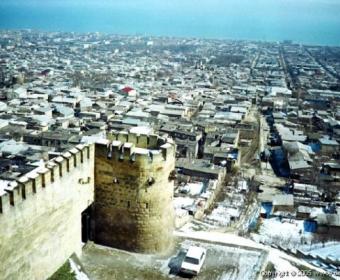
City on Russian-Azerbaijani Border Ready to Explode
City on Russian-Azerbaijani Border Ready to Explode
Relations between ethnic Azerbaijanis and the Dagestani peoples in the North Caucasus republic’s southern city of Derbent have reached a boiling point. Two new acts of vandalism—one against a grave of a Muslim leader venerated by Azerbaijanis and a second against a monument to Nizami, a poet the Azerbaijanis associate with their national history—have prompted officials to try to calm the situation by calling on both sides to avoid “provocations.” These incidents may have also been the cause of the recent change in the city government (Vesti.az , January 8, 2015; Haqqin.az, January 9, 2015).
Ethnic Azerbaijanis, form approximately a third of the population in Derbent, Dagestan—a city of 120,000 near the Russian-Azerbaijani border. And the Lezgins, a Dagestani nationality, make up another third. Relations between these two groups have frequently been tense: Last October, for example, a monument to an Azerbaijani war hero was vandalized. The situation now, however, is both worse and more significant than at any time in the recent past.
For one thing, Azerbaijanis in the city say that the Derbent authorities are failing to adequately investigate these attacks and have announced plans to stage demonstrations to force magistrates to look into all of these cases of vandalism and bring those responsible to justice. If the city authorities bungle the investigative and judicial process, it could make the situation even more serious. Secondly, Moscow has been pushing for closer relations with Azerbaijan, hopeful that it can convince Baku to join its Eurasian Economic Union. But any uncontrollable ethnic conflict in Derbent could limit the chances that Azerbaijani President Ilham Aliyev would feel able to take that step.
The current crisis began on January 8, 2015, when persons—still unknown—attacked the grave of Seid Mir-Gafar agi, a place venerated by Azerbaijani Muslims. The incident intensified when, two days later, someone desecrated a monument to the Azerbaijani poet Nizami. Officials said they were investigating but have not made any arrests. To Azerbaijanis, the Derbent authorities’ actions echoed what happened last fall when the bust of an Azerbaijani war hero, Shamsulla Aliyev, was thrown onto a trash heap in the course of the reconstruction of the Derbent Park of Military Glory. No one has yet been held responsible for that act (Nazaccent.ru, January 9, 2015).
As a result, and apparently encouraged by reports about these events, which were coming from Azerbaijani news outlets in Baku, groups of ethnic Azerbaijanis said that they would take to the streets to press their cause and demand that officials do something to stop the attacks on their community. Dagestani officials grew fearful that any such protest could quickly spin out of control, creating problems between Russia and Azerbaijan and possibly draw retribution from Moscow for failing to maintain peace and quiet in the border city. Thus, republican authorities launched a media campaign calling on Azerbaijanis and others to avoid falling victim to what they said were provocations.
The press service of the government of Dagestan released a special statement decrying what it said were “attempts of certain forces to introduce distrust and suspicion between our peoples” and declaring that such attempts would “never” succeed. The press release quoted Ramazan Abdulatipov, the head of Dagestan, as saying that, “Dagestan and Azerbaijan have a historically close culture and a common history. Never has anyone been able to make the two peoples angry at one another. Instead, they have always lived in peace and concord, especially now… We are sincerely interested in the development of economic and cultural relations with fraternal Azerbaijan… relations that are based on the traditionally good relations between Vladimir Vladimirovich Putin and Ilham Geydarovich Aliyev, the heads of our states and the leaders of our peoples” (Nazaccent.ru, January 12, 2015; Vestnik Kavkaza, January 10, 2015).
That was followed by a statement from the Derbent city administration, which declared: “We are convinced that Derbent was and always will remain a city where representatives of various nationalities and faiths live in peace and respect for one another.” They also announced that they had repaired the damaged monuments and that several officials had been replaced, although they did not say that they had been replaced because of these incidents. Nor have they announced any progress in the investigations they say have been launched. As a result, tensions remain high (Islamrf.ru, Chernovik.net, January 12, 2015).
Derbent is one of the oldest cities in the world, with a history stretching back more than 5,000 years. It is the site of the oldest mosque in the Russian Federation. And its name is symbolic: Built between two walls extending from the sea to the mountains and controlling the north-south routes between the Middle East and the steppes to the north, “Derbent” means “closed gates” in Persian. Those gates are now opening. What is coming in, however, is not stability, but the possibility that acts of vandalism may trigger an ethnic conflict that will extend not only across those walls but across what is now the international border between Russia and Azerbaijan.


